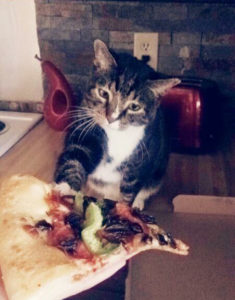The butter had vanished. But it couldn’t have gone too far, Becca had only left the kitchen for a second. She searched among the assortment of ingredients she had set on the counter in preparation for baking cookies. As she checked under the table, she heard a smacking sound coming from the living room…
Hera the mastiff was laying on top of her massive ottoman in the perfect likeness of a queen who had just polished off an exquisite feast. Becca tried to interrupt her, but both sticks of butter were history. She immediately thought about pancreatitis, which occurs when the pancreas becomes inflamed. While certain breeds and obese dogs are more prone to bouts of pancreatitis and the causes can vary, fatty foods are a common cause (and two sticks of butter contain enough fat to cause many dogs issues).
The signs of pancreatitis include loss of appetite, intense belly pain, vomiting, diarrhea, dehydration, and lethargy. Treatment for pancreatitis might include lab work, pain management, fluids, and hospitalization. Permanent organ damage can occur in severe cases, but pancreatitis is treatable if veterinary attention is sought quickly.
Becca called Hera’s veterinarian, who advised her to give hydrogen peroxide to induce vomiting (she had only eaten the butter a couple minutes ago and hadn’t yet digested it). But Hera worked too hard for her stolen treat to lose it all this easily. She used all her strength to get away from the bitter smelling substance dripping off the spoon aiming toward her mouth. Becca understood the futility of arm-wrestling this lion and decided she would have to out-smart her. She mixed the hydrogen peroxide with some xylitol-free peanut butter and Hera gobbled it up without hesitation. Within a couple minutes, Hera vomited both sticks of butter (wrappers included). By inducing vomiting before the butter was digested, Becca helped Hera avoid the painful illness and unpleasant hospitalization.
Pancreatitis is a painful illness which occurs when the pancreas becomes inflamed and begins to digest itself. While some animals are more prone to pancreatitis than others, fatty foods are a common cause for many pets. Other pets who are more prone to pancreatitis have more specific needs and should not be given certain types of bones or pet foods. To reduce the risk of pancreatitis, avoid feeding foods that are high in fat and call your veterinarian if your pet happens to get into something they are not supposed to. Always check with a veterinarian before inducing vomiting.

